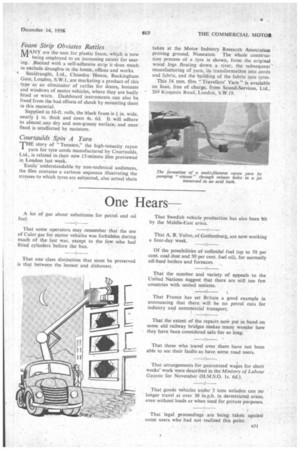One Hears
Page 39

If you've noticed an error in this article please click here to report it so we can fix it.
A lot of gas about substitutes for petrol and oil fuel.
That some operators may remember that the use of Calor gas for motor vehicles was forbidden during much of the last war, except to the few who had fitted cylinders 'before the ban.
That one class distinction that must be preserved is that between the honest and dishonest. That Swedish vehicle production has also been hit by the Middle-East crisis.
That A. B. Volvo, of Gothenburg, are now working a four-day week.
Of the possibilities of colloidal fuel (up to 50 per cent. coal dust and 50 per cent, fuel oil), for normally oil-fised boilers and furnaces.
That the number and variety of appeals to the United Nations suggest that there are still too few countries with united notions.
That France has set Britain a good example in announcing that there will be no petrol cuts for industry and commercial transport.
That the exteni of the repairs no* put in hand on some old railway bridges makes many wonder how they have been considered safe for so long.
That those who travel over them have not been able to see their faults as have some road users.
That arrangements for guaranteed wages for short weeks' work were described in the Ministry of Labour Gazette for November (H..M.S.O. is. 6d.).
That goods vehicles under 3 tons unladen can no longer travel at over 30 m.p.h. in derestricted areas, even without loads or when used for private purposes.
That legal proceedings are being taken against some users who had not realized this point.
















































































































